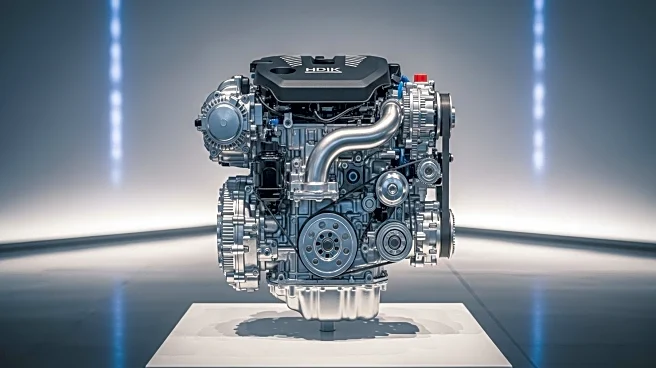What is the story about?
What's Happening?
Porsche has introduced a new variant of the 911 Turbo S at the IAA Mobility show in Munich, Germany, featuring a cutting-edge hybrid powertrain. This model is the most powerful 911 to date, excluding limited-run models, and boasts impressive acceleration capabilities, reaching 60 mph in just 2.4 seconds. The innovative hybrid system includes a newly designed 3.6 L flat-six engine, which eliminates the traditional belt drive and utilizes a 400 V traction battery to power various components. The system, first seen in the 911 GTS T-Hybrid, incorporates electric turbochargers that function similarly to the MGU-H in Formula 1 cars, spinning up to 120,000 rpm to eliminate throttle lag and recapture excess energy for the battery pack. The 2026 911 Turbo S features two of these electric turbochargers, along with a 53 hp permanent synchronous motor within the eight-speed dual-clutch transmission, delivering a total output of 701 hp and 590 lb-ft of torque.
Why It's Important?
The introduction of Porsche's advanced hybrid engine in the 911 Turbo S marks a significant development in automotive technology, blending high performance with energy efficiency. This innovation reflects the industry's shift towards electrification, aiming to enhance vehicle responsiveness while reducing environmental impact. The hybrid system's ability to eliminate throttle lag and recapture energy positions Porsche as a leader in integrating Formula 1-inspired technology into consumer vehicles. This advancement could influence other manufacturers to adopt similar technologies, potentially accelerating the transition to more sustainable automotive solutions. Consumers seeking high-performance vehicles with improved fuel efficiency stand to benefit from these developments.
What's Next?
Porsche's unveiling of the 911 Turbo S with its advanced hybrid engine may prompt other automakers to explore similar technologies, potentially leading to increased competition in the hybrid and electric vehicle market. As the industry continues to evolve, Porsche's innovation could drive further advancements in hybrid powertrains, encouraging manufacturers to prioritize performance alongside sustainability. The market response to this model will likely influence Porsche's future strategies in developing high-performance hybrid vehicles, possibly expanding their lineup to include more models with similar technology.
Beyond the Headlines
The integration of Formula 1-inspired technology into consumer vehicles raises questions about the future of automotive engineering and the potential for cross-industry innovation. Porsche's approach highlights the possibilities of leveraging high-performance racing technology to enhance everyday driving experiences, potentially setting a precedent for other manufacturers. This development may also spark discussions on the ethical implications of prioritizing performance in the context of environmental sustainability, challenging the industry to balance consumer desires with ecological responsibility.
















